Six outstanding alumni will be honored for their service to and support of their alma mater at the University’s Founders Day celebration scheduled for Nov. 3 at America’s Center.
Selected by the Alumni Board of Governors, the Distinguished Alumni Award recipients are: Nathan O. Hatch (GR 72, GR 74), president of Wake Forest University; Charlotte D. Jacobs (MD 72), oncologist and professor of medicine at Stanford University; Steven F. Leer (GB 77), chairman and chief executive officer of Arch Coal Inc.; William B. Pollard III (LA 70), a partner in Kornstein Veisz Wexler & Pollard LLP law firm; Philip D. Shelton (LW 72), former president and executive director of the Law School Admission Council; and J. J. Stupp (GB 83), chief financial officer of Exegy Inc., a technology licensing company.
(This is the second of a two-part story on Founders Day. The Oct. 18 Record profiled the four faculty members receiving the Distinguished Faculty Awards as well as the recipients of the Robert S. Brookings Awards.)
Nathan O. Hatch
An eminent scholar of the history of religion in America, Hatch also has made his mark as an effective administrator.
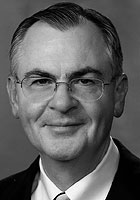
After earning master’s and doctoral degrees in history in Arts & Sciences, Hatch held postdoctoral fellowships at Harvard and Johns Hopkins universities. In 1975, he began a long career at the University of Notre Dame, first as a faculty member and eventually becoming the Andrew V. Tackes Professor of History. In 1980, he began directing a number of undergraduate, graduate and professional programs at Notre Dame. In 1996, he became the first Protestant to serve as provost.
The author and editor of several books, Hatch is best known for his 1989 book, “The Democratization of American Christianity,” which examined the effects of religious movements in 19th- century America on culture and politics.
In 2005, Hatch became the 13th president of Wake Forest University in Winston-Salem, N.C. One of his hallmarks was the creation of a Presidential Trust for Faculty Excellence, which supports faculty scholarship. He also has embarked on a comprehensive strategic-planning process for the future of Wake Forest.
His professional contributions include serving on the National Council on the Humanities, which is the advisory arm for the National Endowment for the Humanities. Hatch also serves on the board of directors of the American Council on Education, chairs the NCAA Committee on Athletics Certification, is a member of the Business Higher Education Forum and serves as a trustee of the Fuller Theological Seminary.
Charlotte D. Jacobs
Most of Jacobs’ career as a clinical oncologist and medical educator has been with Stanford University’s School of Medicine. She earned a medical degree from the University in 1972, which was followed by residencies at the School of Medicine and at the University of California, San Francisco (UCSF). Upon completing a postdoctoral fellowship at Stanford, she joined its faculty as acting assistant professor of medicine in the Division of Oncology, specializing in head and neck cancers. Shortly after her promotion to full professor, Jacobs was appointed the Drs. Ben and A. Jess Shenson Professor.
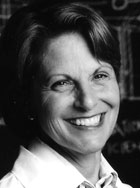
While at Stanford, Jacobs managed a number of medical school and clinical care responsibilities, including the Oncology Day Center. She also served as senior associate dean for education and student affairs. From 1997 to 2001, Jacobs directed Stanford’s Clinical Cancer Center. She served for a brief time as director of the Clinical Cancer Program at UCSF.
She has dedicated many years of service to the American Society of Clinical Oncology and has been on its Education Planning, Nominations, Health Services, Oncology Manpower and Strategic Planning Groups committees in addition to the Conflict of Interest subcommittee.
The list of professional awards Jacobs has received attests to her significant contributions in both teaching and research. She has earned a presidential citation from the American Society of Head and Neck Surgery, a Kaiser Foundation Award for Innovative and Outstanding Contributions to Medical Education and the Alvin C. Rambar Award for Excellence in Patient Care. From Stanford, she has received five outstanding teaching awards.
WUSTL has given Jacobs its Aphrodite Hofsommer Award for outstanding academic accomplishments and the School of Medicine’s Alumni Achievement Award. In addition to assisting in planning school reunions, Jacobs is a long-standing contributor at the Eliot Society level to the medical school’s Class of 1972 scholarship fund.
Steven F. Leer
As an undergraduate in the early 1970s, Leer became interested in the energy industry. After earning a master’s degree in business administration at the Olin Business School, he took a job with Ashland Oil Inc. Thus began, through a succession of mergers and acquisitions, his distinguished career with Ashland and its subsidiaries.
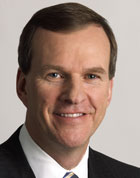
Over the years, Leer held a number of executive management titles within Ashland: The Valvoline Co. (a subsidiary), Ashland Coal Inc. and Arch Mineral (another affiliation of Ashland). Under his direction, Ashland acquired Arch Mineral Corp., Ashland Coal Inc. and Arco Coal, creating the second-largest U.S. coal producer. In 1998, he was named president and chief executive officer of Arch Coal Inc.
Keeping a company thriving in an industry full of challenges is not easy, and Leer has been recognized for being at the forefront of innovation for clean coal and coal conversion initiatives. In 2005, he was included in BusinessWeek’s “Web Smart 50.”
Leer serves on numerous boards, including Norfolk Southern Corp., USG Corp. and the Western Business Roundtable. He represents the industry through chairing the Coal Industry Advisory Board of the International Energy Agency and as a board member of the Center for Energy and Economic Development, the National Coal Council and the National Mining Association.
His generosity extends not only to the Olin Business School, for which he serves on its National Council, but also as a member of the advisory board of the Weidenbaum Center on the Economy, Government and Public Policy.
Last year, Leer was appointed to the Advisory Committee for the International Center for Advanced Renewable Energy & Sustainability (I-CARES), a major new environmental initiative at the University.
William B. Pollard III
Pollard credits his undergraduate experience with giving him the analytical abilities and the drive for excellence that have served him well throughout a 30-year career in law.
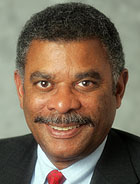
He earned a bachelor’s degree in political science in Arts & Sciences in 1970 then earned law and master’s of business administration degrees from Columbia University. After graduation, the St. Louis native stayed in New York and began carving out a distinguished reputation as a civil, white-collar and regulatory enforcement litigator. In 1974, he joined Paul Weiss Rifkind Wharton & Garrison law firm, specializing in commercial litigation.
Pollard left the private sector to serve as an Assistant United States Attorney in the U.S. Attorney’s Office for the Southern District of New York, the nation’s premier prosecutorial office. Several years later, he was chosen by then U.S. Attorney Rudolph Giuliani to serve as Deputy Chief of the Criminal Division. He returned to private practice five years later and continues as a partner with the firm Kornstein Veisz Wexler & Pollard LLP.
Pollard’s service to his alma mater has been exceptionally generous and includes membership on the Black Alumni Council and the New York Regional Cabinet. In addition, he chairs The Tie That Binds, a network that generates scholarship funding among WUSTL’s African-American alumni. For 13 years he served on the Arts & Sciences National Council. He and his wife have recently established an endowed scholarship in Arts & Sciences.
Philip D. Shelton
Within just a few years after Shelton earned a juris doctorate from the School of Law in 1972, he found his true calling: teaching and academic administration. In 1974, he returned to his alma mater as a visiting assistant professor. The following year, he became associate dean, and after serving in that role for a decade, Shelton was named acting dean. He served in that capacity until 1987, when he was appointed dean and professor of the Walter F. George School of Law at Mercer University in Macon, Ga.
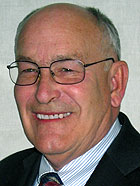
In 1993, Shelton became president and executive director of the Law School Admission Council (LSAC), the U.S./Canadian organization that serves the needs of law schools and their applicants. In this capacity, Shelton oversaw all responsibilities for the study of legal education, including the administration of the Law School Admission Test (LSAT).
During his tenure, which ended this year, Shelton instituted measures to expand access to legal education for underrepresented and disadvantaged persons.
Shelton’s professional service has been dedicated to LSAC, for which he has served on its board 24 of the last 26 years. While living in St. Louis, he served as a member of the Board of Directors of Legal Services of Eastern Missouri Inc.
He has served on the School of Law’s National Council. He recently established the Philip Shelton Fellowship Fund to support diversity in the law school student body. In 1999, he was honored with the School of Law Distinguished Law Alumni Award.
J. J. Stupp
A pioneer in the emergence of St. Louis as a high-tech center, Stupp has influenced a great many of the city’s startups. Most important, she helped create the current positive conditions in her hometown for these types of companies.
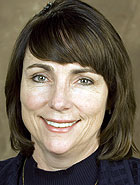
Stupp earned a master’s degree in business administration from WUSTL in 1983 and immediately went to work for a local real estate investment firm. Quickly becoming part of the technology community, she helped design and develop the St. Louis Technology Center. She also helped write the initial state legislation for the Missouri Innovation Center program, later serving as the Center’s first manager.
Her involvement with several startup companies throughout the past 25 years has included managerial, financial advising and investing roles. These firms have been as diverse as one that developed diode-pumped lasers for medical, commercial and military applications to the publishing of award-winning educational games.
Today Stupp is chief financial officer of Exegy Inc., which she co-founded with the University in 2003. The company licenses a technological advancement that provides extremely fast and flexible solutions for searching, analyzing and processing data. This important technique originated in the University’s School of Engineering. Among Stupp’s first employees are fellow alumni.
As a longtime member of the Alumni Board of Governors, she has contributed her time and talents to its Young Alumni and Technology groups and served as its chair from 2004-05.
For Olin, she has served as president of the Business School Alumni Executive Committee and is a member of its National Council and its Entrepreneurship National Council.